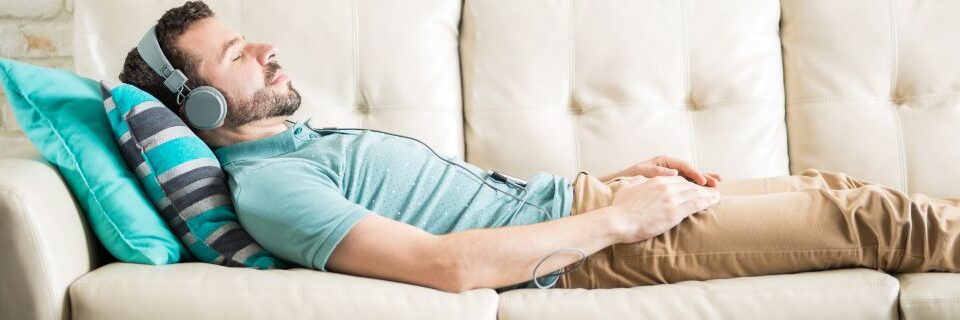
How To Sleep Better: 5 Tips To Getting a Good Night’s Rest

UpNow’s Quit Smoking Hypnosis App: Quit Smoking for Good
Table of Contents
Are you tired of waking up tired? Have you been spending more time trying to sleep than sleeping? Do you find that you toss and turn at night or wake frequently throughout the night? Many people struggle to get the sleep they need, which could be increasing their stress levels during the day and their risk of certain health problems. Here is what you need to know to sleep better.
Improving your Sleep Naturally
While many people turn to medication to fall asleep faster or stay asleep longer, medication is not without risk. Unwanted side effects are common, and many drugs carry with them the risk of dependency. The good news is that most people often respond well to lifestyle changes when it comes to improving sleep. These five tips can help you transform your sleeping habits.
1. Understand the process
Sleep is a natural process. Your body naturally regulates its circadian rhythms, but as you age, the way it regulates these rhythms can change. Your internal clock may shift and alter how it responds to changes in light and dark. In women, this is most likely to occur around menopause. You might find that it is harder to fall asleep or stay asleep at night. Younger adults might struggle for other reasons, including pain, depression, certain medications, alcohol, caffeine, stress, and anxiety. Learning to work with your body’s natural cycles can help you counteract the issues that are keeping you awake and develop a healthier new attitude towards sleep.
2. Evaluate your diet and exercise routine
These are virtually the first suggestions in any list and for good reason: Diet and exercise are often the first habits to slip and the easiest ones to fix. Make sure that you are eating to nourish your body but avoid eating too much just before bedtime. Exercise daily or at least most days of the week. Exercise can be the best sleep aid. It boosts the production of melatonin, a natural sleep hormone, but try to get your workout earlier in the day so that your Zumba class does not leave you too stimulated to snooze.
3. Check your sleep environment
A loud or chaotic sleeping environment is not conducive to healthy sleep. Your bedroom should be reserved for rest and intimacy. If you spend hours in your bedroom scrolling social media, watching TV, returning work emails, and engaging in other stimulating tasks, you might find yourself struggling to fall asleep at the end of your day. Turn off the TV, turn on your “do not disturb,” and put your away message on. Set the thermostat to a comfortable temperature, and use comfortable, cozy bedding and pillows that soothe you so that you go to sleep fast.

4. Cut substances
Many of us enjoy a cup of tea or coffee to start the day or a glass of wine to unwind in the evening. These substances seem harmless, but they could be interfering with our ability to relax and fall asleep at night. Coffee, tea, and even chocolate contain eye-opening caffeine, which could disrupt your sleep. Wine, beer, and other alcoholic drinks might make you feel drowsy, but they are not the best sleep aid. In fact, they are stimulants and can disrupt your sleep cycles. Avoid using them too close to bedtime for the best results.
5. Engage in some self-care rituals
Are you feeling deprived about giving up caffeine, alcohol, and some of your favorite snacks to get better sleep? Now is your chance to give a little something back to yourself. Many of us spend our days rushing from one task to another and then fall into bed exhausted expecting to fall asleep. We give ourselves little or no time to relax, and our stressed bodies and minds are still racing, filled with the cares and worries of the day.
Having a self-care ritual can be one of the best ways to relax at the end of the day. Remember how, as a child, you enjoyed hearing a bedtime story and getting tucked into bed? You can recreate that same sense of comfort and familiarity with your bedtime rituals. Begin with a warm mug of soothing chamomile or another herbal tea. Take a warm bath while listening to calming music. Listen to a mindful hypnosis app to help recenter yourself, and then tuck yourself into your cozy warm bed while practicing deep breathing to let go of the day’s worries and cares.
Sleep is necessary for good health, function, and focus. Too many of us are not getting the sleep we need or struggle to go to sleep fast. With these tips, you can get the sleep you need and sleep better, too. Visit UpNow.com today to find out more or to download our app.
UpNow Health only uses high-quality sources, including peer-reviewed articles, to support the facts within our articles. All our articles are reviewed by experts to ensure that our content is accurate, helpful, and trustworthy.
1. Buxton, O. M., L’Hermite-Balériaux, M., Hirschfeld, U., & Van Cauter, E. (1997). Acute and Delayed Effects of Exercise on Human Melatonin Secretion. Journal of Biological Rhythms, 12(6), 568–574. https://doi.org/10.1177/074873049701200611
2. Cleveland Clinic. (2013). Sleep Disorders | Cleveland Clinic. Cleveland Clinic. https://my.clevelandclinic.org/health/articles/11429-common-sleep-disorders
3. Ferré, S., & O’Brien, M. C. (2011). Alcohol and Caffeine: The Perfect Storm. Journal of Caffeine Research, 1(3), 153–162. https://doi.org/10.1089/jcr.2011.0017
4. Jehan, S., Masters-Isarilov, A., Salifu, I., Zizi, F., Jean-Louis, G., Pandi-Perumal, S. R., Gupta, R., Brzezinski, A., & McFarlane, S. I. (2015). Sleep Disorders in Postmenopausal Women. Journal of Sleep Disorders & Therapy, 4(5).
https://www.ncbi.nlm.nih.gov/pmc/articles/PMC4621258/
5. Li, J., Vitiello, M. V., & Gooneratne, N. S. (2018). Sleep in Normal Aging. Sleep Medicine Clinics, 13(1), 1–11. https://doi.org/10.1016/j.jsmc.2017.09.001











